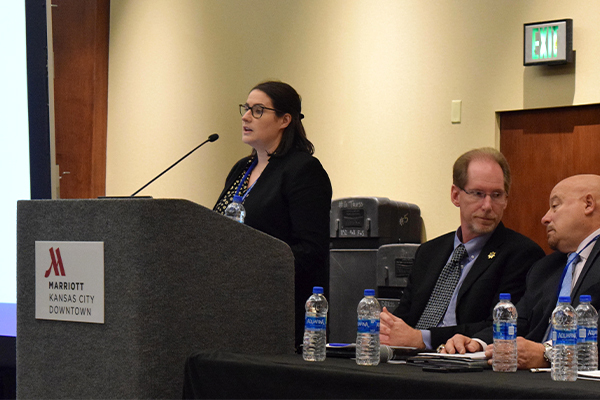
On April 17, the Crime and Justice Institute (CJI) led a panel discussion on safely reducing parole revocations through evidence-based decision-making at the Association of Paroling Authorities International (APAI) annual training conference in Kansas City, Missouri.
The panel, “Promoting Success on Community Supervision: Strategies for Improving Outcomes and Reducing Revocations,” was presented by CJI staff members Colby Dawley, Valerie Meade, and Maja Vlajnic based on findings from CJI’s Promoting Success on Supervision national revocation report, released in July 2022. This report was the culmination of partnerships with community supervision agencies in Colorado, Florida, Mississippi, and Montana. Through these partnerships, CJI sought to better understand the drivers of revocations from community supervision and identify policy and practice changes to safely improve supervision outcomes.
CJI presenters were joined by panelists Deputy Director of the Montana Department of Corrections Cynthia Wolken, Board Member of the Montana Board of Pardons and Parole Jimmy Patelis, Assistant Secretary of Florida Department of Corrections Joe Winkler, and Director of the Colorado Parole Board Mike Tessean.
Takeaways from Panel Discussion
CJI’s assessment across the four states revealed several thematic findings. While more individuals successfully completed supervision than were revoked in 2019 across all four states, revocations due to technical violations occurred frequently, often for substance use related violations and reporting violations such as missed supervision or treatment appointments.
CJI found there were several barriers impacting success on supervision, including availability and access to behavioral health treatment. Panelists shared some of the solutions they are working on implementing to expand case management and connect individuals to treatment services including, in Florida, the implementation of mobile probation units that bring resources into the community for easier access.
Across all four states, CJI also found that individuals were most likely to be revoked within the first year of supervision. This finding supports existing research emphasizing the critical importance of ensuring resources are available and accessible to individuals in the first few months of supervision when they are most at risk of failing. To remedy this, panelists discussed their agencies’ efforts to set individuals up for success at the start of supervision, including partnering with community-based nonprofits that assist with multiple reentry needs.
Finally, CJI found that in some states individuals were ordered to comply with a high number of supervision conditions and across all four states. Conditions often did not align with an individual’s risk level or criminogenic needs. Criminogenic needs, such as substance use disorders, may be targeted by specific interventions that reduce an individual’s risk of recidivism. Panelists discussed an interest in working with other justice system stakeholders involved in the condition setting process – including other parole board members and judges – to determine what conditions enhance public safety and which conditions merely create obstacles to supervision success.
Next Steps
Over the next 18 months, CJI will provide implementation support to a few of the agencies involved in the first phase of the project and will do a deeper dive into the factors driving absconding. CJI is working with leadership and staff at the Montana Department of Corrections and the Florida Department of Corrections to create trainings and procedures that address some of the challenges supervision agencies face. Additionally, CJI will release a national report that outlines trends related to absconding and recommendations on how agencies can better track and prevent absconding behavior.